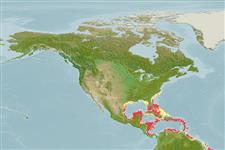>
Ovalentaria/misc (Various families in series Ovalentaria) >
Opistognathidae (Jawfishes)
Etymology: Opistognathus: Greek, opisthe = behind + Greek, gnathos = jaw (Ref. 45335); to the very elongate upper jaw of the type species of the genus, Opistognathus nigromarginatus (Ref. 128653); macrognathus: Name from Greek 'makros' for long and 'gnathos' for jaw (Ref. 26893).
More on author: Poey.
Environment: milieu / climate zone / depth range / distribution range
Ekologi
marina revassocierade; djupintervall 0 - 44 m (Ref. 26893). Tropical
Western Atlantic: southern Florida, USA and Bahamas to northern South America. Including Antilles but absent in Jamaica (Ref. 26938).
Size / Vikt / Age
Maturity: Lm ? range ? - ? cm
Max length : 20.0 cm TL hane/ej könsbestämd; (Ref. 7251)
Taggstrålar i ryggfenan (totalt) : 11; Mjukstrålar i ryggfenan (totalt) : 16 - 17; Taggstrålar i analfenan: 3; Mjukstrålar i analfenan: 14 - 16. Black spot on upper half of dorsal fin from sixth or seventh to ninth spines. Males have long, upcurved extension of maxillary bone marked with black bands (Ref. 26938). Females appear to lack the long double-banded maxilla, and there is only a single blackish band at the corner of the mouth (Ref. 13442).
Inhabits sandy bottoms near coral reefs (Ref. 9710). Feeds on gastropods, crabs and fishes (Ref. 13628). Monogamous (Ref. 52884). Oviparous, mouthbrooding by males (Ref. 205).
Life cycle and mating behavior
Maturities | Reproduktion | Spawnings | Egg(s) | Fecundities | Larver
Displays facultative monogamy where males are constrained to mate with a single female due to resource limitation (Ref. 52884). Males incubate the eggs in the mouth (Ref. 205).
Robins, C.R. and G.C. Ray, 1986. A field guide to Atlantic coast fishes of North America. Houghton Mifflin Company, Boston, U.S.A. 354 p. (Ref. 7251)
IUCN Red List Status (Ref. 130435)
Threat to humans
Harmless
Human uses
Fiskeri: kommersiell; Akvarium: Kommersiell
Verktyg
Special reports
Download XML
Internet-källor
Estimates based on models
Preferred temperature (Ref.
123201): 25.3 - 28.1, mean 27 °C (based on 180 cells).
Phylogenetic diversity index (Ref.
82804): PD
50 = 0.5000 [Uniqueness, from 0.5 = low to 2.0 = high].
Bayesian length-weight: a=0.00389 (0.00180 - 0.00842), b=3.12 (2.94 - 3.30), in cm total length, based on all LWR estimates for this body shape (Ref.
93245).
Trofisk nivå (Ref.
69278): 3.6 ±0.6 se; based on diet studies.
Fishing Vulnerability (Ref.
59153): Low vulnerability (10 of 100).
Nutrients (Ref.
124155): Calcium = 86 [47, 127] mg/100g; Iron = 0.652 [0.404, 1.063] mg/100g; Protein = 18.5 [17.5, 19.5] %; Omega3 = 0.0952 [, ] g/100g; Selenium = 34.8 [17.1, 65.0] μg/100g; VitaminA = 97.3 [34.5, 269.5] μg/100g; Zinc = 1.63 [1.12, 2.23] mg/100g (wet weight);
